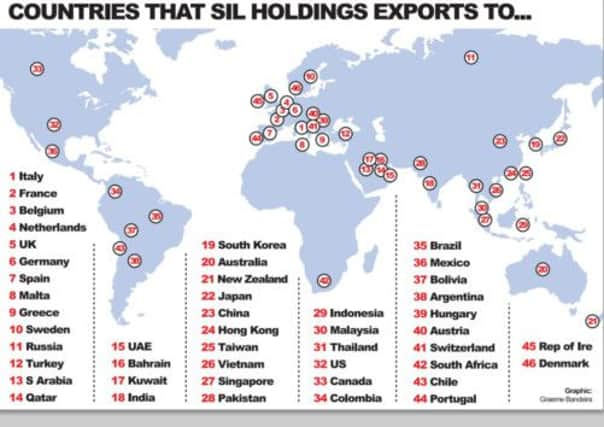Region at heart of fashion industry


SIL Holdings, which is headquartered in Bradford, has over the last five years extended its portfolio by acquiring struggling textile mills, many of which were bought out of administration.
David Gallimore, managing director of SIL’s Luxury Fabrics division, said: “Yorkshire’s textile companies are trend-setters in the global fashion industry.” He added that there is a resurgence of the Made in England brand taking place around the world, and not just in the textiles arena.
Advertisement
Hide AdAdvertisement
Hide AdThe UK market accounts for less than 10 per cent of sales at SIL Holdings, with its fabrics regularly spotted on the catwalks of Paris, New York and Milan.


The family-run textile group, whose customers include the likes of Prada, Louis Vuitton and Gucci, was founded in the 1970s and is now one of the largest speciality fibre manufacturers and merchants in the world, as well as owning cloth brands such as John Foster, William Halstead, Joshua Ellis, Reid & Taylor and Charles Clayton.
The group is behind a campaign, called Wool Yorkshire, being promoted this week to raise awareness of the worldwide reputation of West Yorkshire’s textile trade and coinciding with Campaign for Wool’s Wool Week.
SIL Holdings said “strong export sales and a global reputation” are helping to support growth and innovation in its fibre, yarn, apparel and upholstery businesses.
Advertisement
Hide AdAdvertisement
Hide AdCloth produced by the group’s Yorkshire businesses is exported to markets including the Middle East, Far East, Italy and France. The group’s fibre and yarn businesses also travel the globe buying and selling in areas such as South Africa, South America and China.
Andrew Seal, group managing director, said the region’s mill towns are “at the heart of a global fashion business which recognises the value of craftsmanship, quality, expertise and consistency – all things which derive from our textile manufacturing heritage”.
“Yorkshire’s continued success in this competitive world is down to an ability to consistently produce innovative designs and to reliably exceed our clients’ quality and delivery requirements.”
Mr Gallimore said that trading conditions worldwide are difficult, but that the group, which employs 200 people in Bradford, is performing well around the globe. In 2012, the group recorded a turnover of $46.3m, with pre-tax profits of $943,000, according to Companies House. Mr Gallimore said the group has been investing heavily in the former mills it acquired, putting resources into developing new collections and employing the right people to travel around the world. “(They were) all very, very famous companies in the textile heyday and now part of the SIL Group, providing us with a really wide, strong base.”
Advertisement
Hide AdAdvertisement
Hide AdIn an interview published yesterday, the head of British fashion house Burberry, Angela Ahrendt, told French newspaper Les Echos that China’s slowdown could be more than just a passing phase for the luxury goods sector.
Meanwhile, sales growth at Louis Vuitton halved this year as it failed to anticipate consumers’ move away from logo-branded luxury goods, Chinese demand cooled and it put the brake on expansion.
Burberry makes its iconic trenchcoat in Yorkshire, while Louis Vuitton has a store in Leeds. But Mr Gallimore said that, for SIL Holdings, the Chinese market is performing well. “There have been growth areas such as China, which is doing very well, and we continually invest in other markets which are up and coming.”